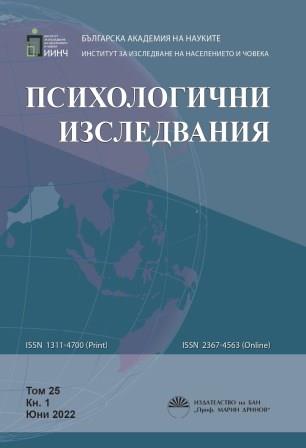The Social Understanding of Bulgarian Bilingual Children - Theory of Mind Perspective
The Social Understanding of Bulgarian Bilingual Children - Theory of Mind Perspective
Author(s): Hristo KyuchukovSubject(s): Psychology, Personality Psychology, Clinical psychology
Published by: Институт за изследване на населението и човека - Българска академия на науките
Keywords: Theory of Mind; bilingualism; wh-questions; evidentiality; Romani; Turkish; Bulgarian.
Summary/Abstract: Background: The paper presents a study with 120 minority bilingual children from Bulgaria. 60 Roma-Bulgarian and 60 Turkish- Bulgarian children between the age of 3;6-5;0 years old are tested with two classical Theory of Mind tests, with two non-verbal Theory of Mind test, wh- questions using the mental state verb “to say”, and evidentiality test in both mother tongue L1 (Turkish and Romani) and in L2 (Bulgarian). The Turkish children live in a small town and the Roma children in a village. Hypotheses: The hypotheses are that the knowledge of grammatical categories can help the children to understand the Theory of Mind and the residence facilitates the development of Theory of Mind in children. Results: The results from the tests showed that in some Theory of Mind tests the Turkish children are better and in other test the Roma children performance is better. The knowledge of the grammatical categories does not influence the understanding of Theory of Mind task. The residence is not a factor facilitating the Theory of Mind of Bulgarian minority bilingual children. The results from the tests showed that in some Theory of Mind tests the Turkish children are better and in other test the Roma children performance is better. The knowledge of the grammatical categories does not influence the understanding of Theory of Mind task. The residence is not a factor facilitating the Theory of Mind of Bulgarian minority bilingual children. Conclusions The hypotheses that the knowledge of some grammatical categories could be a factor which helps Bulgarian bilingual children better to understand the Theory of Mind is partly fulfilled. The second hypotheses regarding the structure of the languages which the bilingual children use and how much they facilitates the early understanding of the False Belief tasks is also partly answers. The last hypothesis that the residence of the children is a factor for understanding of the Theory of Mind task is not confirmed. Both group of bilingual children bilingual show similar trends and that does not depend on their place of residence.
Journal: Психологични изследвания
- Issue Year: 25/2022
- Issue No: 1
- Page Range: 43-60
- Page Count: 18
- Language: English

